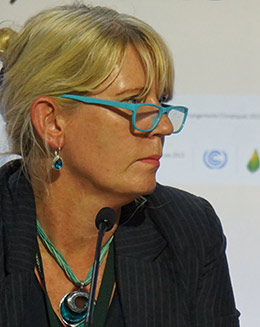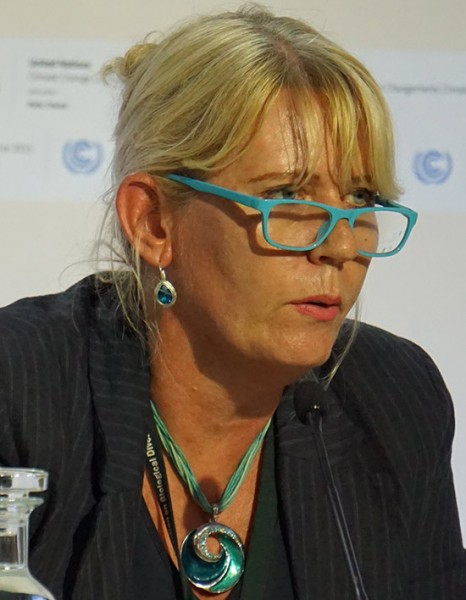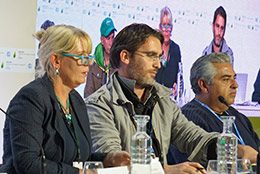Simone Lovera of the Global Forest Coalition appeared as a panelist inside COP21 to comment on a draft of the Paris Agreement.
 Other panelists were Eberto Diaz, La Via Campesina, Jose Bravo, Grassroots Global Justice Alliance, Â and Maxime Combes ATTAC France. The intensity and implications of these arguments sheds some light as to why the delegates will spend so much time struggling over whether or not to include what might appear to be a simple phrase in the text.
Other panelists were Eberto Diaz, La Via Campesina, Jose Bravo, Grassroots Global Justice Alliance, Â and Maxime Combes ATTAC France. The intensity and implications of these arguments sheds some light as to why the delegates will spend so much time struggling over whether or not to include what might appear to be a simple phrase in the text.
“We’ve seen the latest text and we are very concerned that there are still references to a so called net approach in that text, which basically means that forests and land use in general, including agriculture, could be used as compensation for fossil fuel emissions, you know, the net zero approach, in which means that you can continue to emit as long as you compensate it by planting a bunch of trees.â€

“through accounting mechanisms that are used at the moment, bioenergy is classified as carbon neutral, while in reality it causes massive emissions. It also causes massive deforestation and forest degradation all over the world, and a general degradation of ecosystems” ~ Simone Lovera
“We actually think that this is one of the biggest and most dangerous of all these false solutions. And we’ve actually already see it with bioenergy all over the world. People are calling here for 100% renewables, but it’s over forgotten that in continents like Europe, 60-70% of this renewable energy is in reality bioenergy. And bioenergy is not renewable. It’s not that if you burn a tree, that immediately the next day, boop, there is a new tree. There a tremendous time lapse between burning trees and burning other biomass and the time that that biomass has actually grown back. And that is in the best case, that such a tree actually grows back, it could take up to 150 years.â€
“We do not have 150 years for climate change solutions, we do not even have 10 years for climate change solutions, we need solutions right now. “
“That is why, bioenergy is not carbon neutral at all. And it’s one of those many many myths that has been spinned around in this conference. You know, that through accounting mechanisms that are used at the moment, bioenergy is classified as carbon neutral, while in reality it causes massive emissions. It also causes massive deforestation and forest degradation all over the world, and a general degradation of ecosystems – as has been noted already by many decision makers for example in the convention on biodiversity.â€
“Besides that there’s this whole idea that planting trees would be a solution, but trees, sadly, in these days of climate change, are a very unreliable carbon sink. We’ve already seen all over the world massive forest fires. People that now live between monoculture tree plantations are basically living in a between a time bomb. Because more than anything, monoculture tree plantations are very susceptible to fires. And sadly, instead of restoring lands, we see more and more that governments are promoting monoculture tree plantations.â€
“In countries like Brazil, China, India, EU and the US., we see that as compensations for emissions, massive monoculture tree plantations are being planted. For example, lands that are classified as degraded and marginal, but that are really pastoralist lands, the lands of indigenous peoples, the lands of marginal peoples.â€

“Climate mitigation and resilience is a co-benefit of land use policies that should first and foremost focus on people’s right to food and people’s right to land.†~ Simone Lovera
“And now there an even more dangerous option on the table, which is bioenergy with carbon capture and sequestration. This has been baptized by one of our colleagues as the phantom of the COP opera.”
“Because it doesn’t exist, its scientifically simply not viable. But at the same time, massive subsidies are being pushed into these false solutions, you know as sort of the last angle, to ensure that business as usual can continue while countries pretend, just pretend to mitigate emissions.â€
“And the main victims of this are those people that have weaker land rights, like women. You know, these kind of manipulations around land use, these policies that use land as a resource in which you can just use to mitigate climate change, mainly impacts indigenous peoples, women, and other groups in society that have weak tenure rights, and are just very often kicked off their lands to make a place for these monoculture tree plantations.â€
“We see the same thing in agriculture now, where they are trying to promote climate smart agriculture, which is a very corporate dominant model of big financiers trying to make a very profitable business out of carbon offset sinks…â€
“We think that the whole narrow approach of carbon accounting will always lead to a marginalization of the human rights aspect, of the social aspect, of the land use aspect, of the biodiversity aspect, of ecosystems. And that’s why we do not want land to be included in accounting framework.â€
“Sure, we absolutely absolutely need sustainable land use, we need sustainable agriculture, we need sustainable livestock production. If we really want solutions also to climate change, we need to address the over consumption of unsustainably produced meat and dairy. But we cannot do that through a carbon accounting framework, because we are also talking about people’s foods, we’re talking about people’s lands, we’re talking about people’s rights. So that’s why you need a holistic approach.â€
“Climate mitigation and resilience is a co-benefit of land use policies that should first and foremost focus on people’s right to food and people’s right to land.â€
Report by James George
